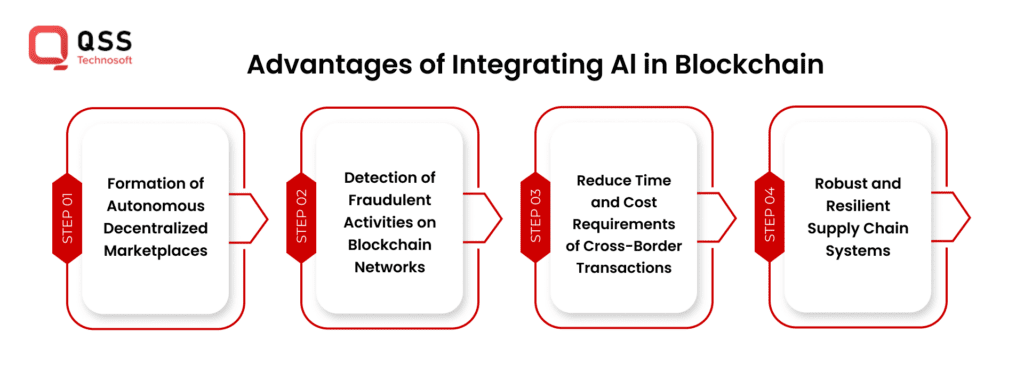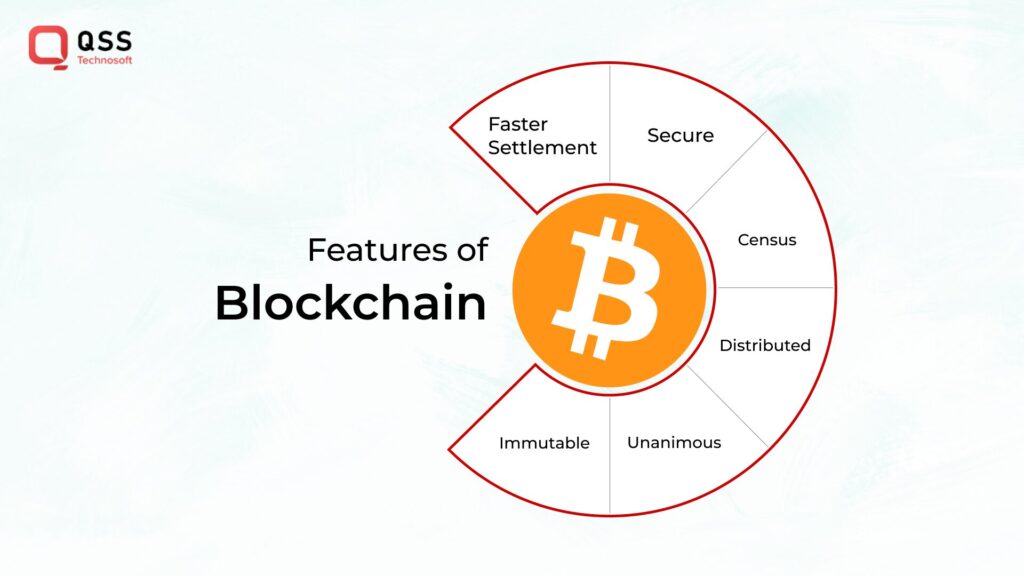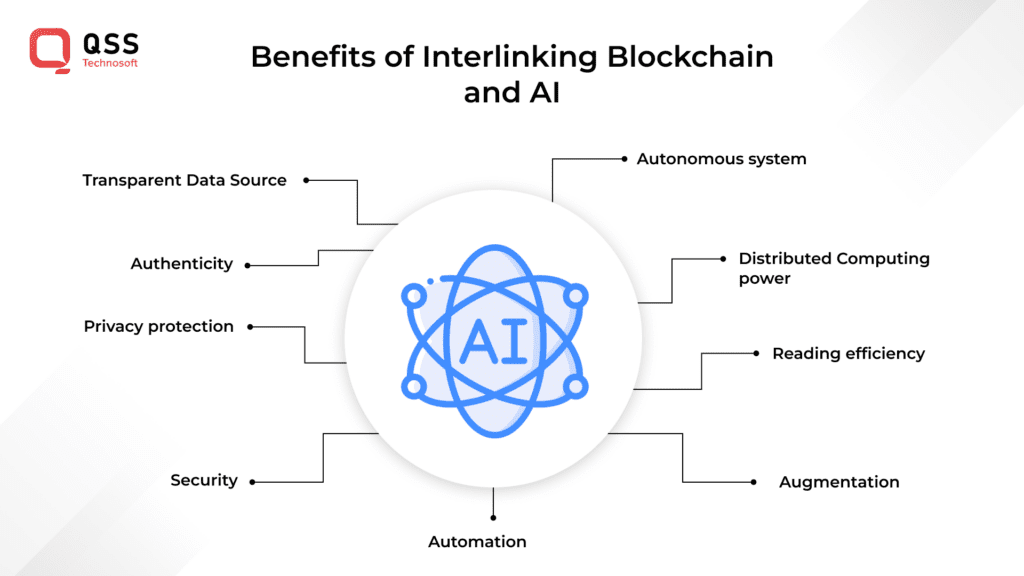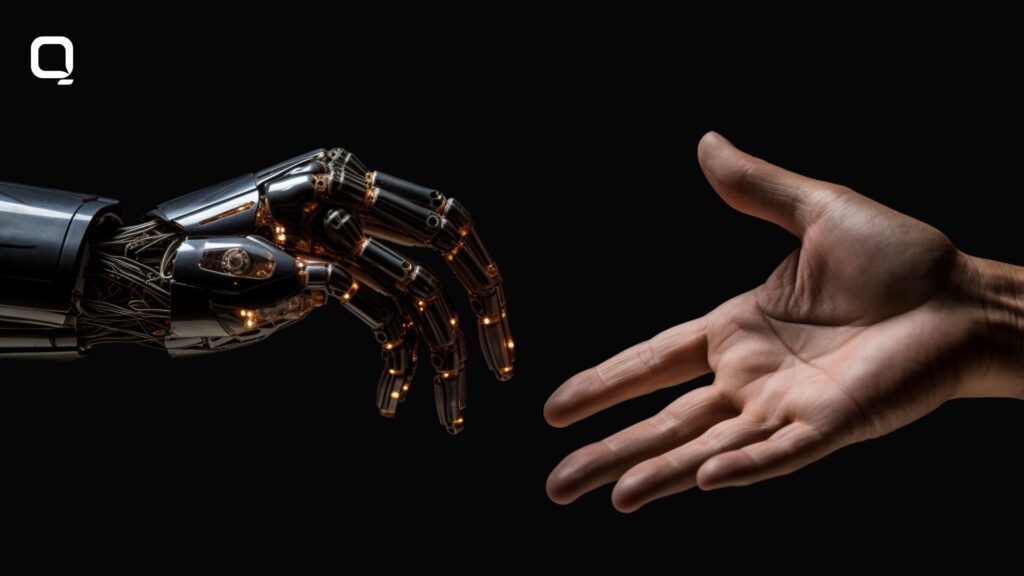Blockchain and Artificial Intelligence (AI) are two of the most transformative technologies of our time, each bringing significant innovations to various industries. While Blockchain ensures trust, transparency, and security in data transactions, AI enables machines to learn, adapt, and make decisions based on data.

The synergy between these two technologies holds enormous potential. By leveraging Blockchain’s decentralized, immutable, and transparent nature with AI’s ability to process and analyze large datasets, businesses can unlock new innovative solutions that enhance efficiency, security, and decision-making.
In this blog, we explore how Blockchain and AI can work together, dive into real-world use cases, and examine the future possibilities of this powerful combination.
Also Read:- What is Ripple Blockchain? Everything You Need to Know in 2024?
Blockchain: A Quick Overview
What is Blockchain?
Blockchain is a decentralized digital ledger that records transactions across multiple systems in a way that is secure, transparent, and immutable. It ensures that data cannot be altered once written, making it a trusted system for recording and tracking information.
Key Features of Blockchain:
Decentralization: Transactions are managed across a distributed network, eliminating the need for intermediaries.
Transparency: Every participant can view the entire transaction history, ensuring openness.
Security: Data is encrypted using cryptographic algorithms, making it virtually impossible to hack.
Immutability: Once recorded, transactions cannot be altered or deleted, ensuring data accuracy.
Consensus Mechanism: Transactions are validated through consensus, ensuring integrity without central control.
Smart Contracts: Automated, self-executing contracts built directly into the blockchain for efficiency and trust.
Traceability: Every transaction can be tracked, improving accountability in business processes.

AI: A Quick Overview
What is Artificial Intelligence?
Artificial Intelligence (AI) refers to the simulation of human intelligence in machines. AI enables computers to perform tasks that normally require human cognition, such as learning, problem-solving, and decision-making, often through machine learning and data analysis.
Key Features of AI:
Machine Learning: AI systems evolve by learning from vast data sets, improving performance without explicit programming.
Natural Language Processing (NLP): AI enables machines to understand, interpret, and generate human language.
Computer Vision: AI can recognize and analyze visual data, such as images and videos, for applications like facial recognition.
Deep Learning: Advanced neural networks enable AI to process unstructured data like audio, images, and text for more complex tasks.
Decision-Making: AI models can make real-time decisions based on data analysis, improving outcomes.
Cognitive Computing: AI mimics human thought processes to handle complex problem-solving.
AI-Powered Chatbots: Provides human-like customer support and interaction, automating communication.
How Blockchain and AI Can Work Together
When integrated, Blockchain and AI can complement each other to solve some of the biggest challenges in data security, transparency, and decision-making.

Data Integrity and Security: Blockchain provides a secure, immutable environment for AI algorithms to access and work with reliable data, reducing the risk of tampered or inaccurate data influencing AI decisions.
Decentralized AI Models: With Blockchain, AI models can be decentralized, eliminating the need for central authorities. This allows for more democratic control over AI decision-making processes.
Data Sharing and Monetization: Blockchain facilitates secure and transparent data sharing between different entities, allowing AI systems to access a broader range of data sources. This can be particularly useful for industries like healthcare, where sensitive data must be protected.
Trust and Transparency: Blockchain can enhance the transparency of AI models by providing a trackable history of AI decision-making processes. This ensures accountability and trust, especially in industries where AI decisions have significant impacts.
AI-Powered Smart Contracts: AI can automate the execution of smart contracts on a blockchain, enabling intelligent, self-executing contracts based on predefined conditions and real-time data analysis.
Decentralized AI Marketplaces: Blockchain can enable secure, decentralized marketplaces where AI models and data sets can be traded and monetized without intermediaries.
AI Governance: Blockchain can provide decentralized governance for AI models, ensuring ethical use and preventing bias by allowing communities to have a say in how AI algorithms are developed and deployed.
Energy Efficiency in AI: Blockchain can be used to manage and optimize the energy consumption of AI computations, especially in distributed systems where resource allocation needs to be tracked transparently.
Tokenized Data Sharing: Blockchain can tokenize data sets for AI training, allowing users to maintain control and be compensated for the data they provide, while AI benefits from high-quality, diverse data.
Supply Chain Automation: AI-driven analytics can be combined with blockchain’s transparent tracking in supply chains to improve efficiency, predict delays, and monitor quality in real-time.
Fraud Detection in Financial Transactions: Blockchain provides a secure ledger for AI systems to monitor and analyze transactions, enhancing the detection of anomalies and potential fraud.
Innovative Use Cases of Blockchain and AI Together
Healthcare
Blockchain ensures patient data is stored securely, while AI analyzes this data to provide personalized treatment recommendations or early diagnoses. For example, AI-powered diagnostic tools can access patient records on a Blockchain to make more accurate and real-time health assessments.
Finance
AI’s predictive capabilities can forecast market trends or detect anomalies, while Blockchain secures financial transactions and ensures data integrity. Together, they can create a transparent, secure, and highly efficient financial system, reducing fraud and improving investment decisions.
Supply Chain
AI enhances supply chain efficiency by predicting demand and optimizing routes, while Blockchain provides real-time visibility and traceability for goods. This combination can lead to more efficient and transparent logistics operations, improving accountability and reducing losses.
IoT (Internet of Things)
AI-powered IoT devices collect and analyze massive amounts of data, while Blockchain secures the data exchange between devices. This ensures trust between devices in an IoT ecosystem and provides secure automation across various applications, including smart cities and autonomous vehicles.
Energy Management
AI optimizes energy consumption in smart grids by predicting demand and managing resources efficiently, while Blockchain ensures transparent and secure energy transactions. This combination can facilitate peer-to-peer energy trading, reduce waste, and create a decentralized energy marketplace.
Real Estate
AI can predict property market trends and evaluate investment risks, while Blockchain streamlines property transactions by securely recording ownership and legal contracts. Together, they enable faster, more transparent real estate deals with automated, AI-driven risk assessments.
Education AI customizes learning paths based on student performance, while Blockchain securely stores academic records and certifications. This ensures the authenticity of qualifications and allows students to share their records globally without fear of tampering.
Intellectual Property (IP) Protection
AI helps detect and prevent copyright infringement, while Blockchain creates immutable records of intellectual property ownership. Together, they safeguard creators’ rights and enable transparent tracking of content usage and royalties.
Digital Identity
AI enhances identity verification and fraud detection processes, while Blockchain secures and decentralizes digital identities. This collaboration can provide a tamper-proof, user-controlled identity system used for services like banking, healthcare, and government verification.
Retail and E-commerce
AI personalizes customer experiences and optimizes inventory management, while Blockchain ensures transparency in product sourcing and payments. This combination improves customer trust and enhances supply chain visibility, leading to higher customer satisfaction and reduced operational costs.
Government Services
AI automates public service operations, such as tax filing or benefit disbursements, while Blockchain ensures secure and transparent management of citizen data and records. This integration can reduce bureaucratic delays, prevent fraud, and improve service efficiency.
Cybersecurity
AI detects and prevents cyber threats in real time by analyzing behavioral patterns, while Blockchain enhances security by ensuring data immutability and decentralized control. Together, they create robust defenses against hacking, data breaches, and other cyber threats.
Legal and Contract Management
AI automates contract analysis and management, while Blockchain enables smart contracts to self-execute based on predefined conditions. This combination improves legal processes by reducing manual intervention, ensuring transparency, and speeding up contract execution.
Also Read:- Crafting Smart Apps with Generative AI- The Future of App Development Industry
Future of Blockchain and AI Collaboration
The combination of Blockchain and AI is still in its early stages, but there are several emerging trends that highlight the immense potential of these technologies working together.
Energy: AI can optimize energy consumption, while Blockchain can securely track and manage energy distribution in decentralized grids.
Government: Blockchain can enhance transparency in government operations, while AI can streamline services and improve decision-making in public administration.
Education: Blockchain can provide verifiable records of educational achievements, while AI offers personalized learning experiences.
As businesses look for ways to innovate, the integration of Blockchain and AI can open up new possibilities in terms of efficiency, security, and trust. Forward-thinking companies are already exploring this combination, unlocking new opportunities for growth and competitive advantage.
Conclusion
In conclusion, Blockchain and AI are two powerful technologies that, when combined, can deliver innovative solutions across industries. The complementary strengths of Blockchain’s security and transparency, paired with AI’s data-driven insights and automation, can create a robust framework for solving some of the most complex challenges facing businesses today.

As these technologies evolve, now is the time for businesses to explore the possibilities of integrating Blockchain and AI to enhance security, boost efficiency, and drive innovation. Embrace the future by leveraging Blockchain and AI to stay ahead in this rapidly changing digital landscape.
We are proud to mention that our work has been recognized by leading B2B reviews and research platforms like GoodFirms, Clutch, MirrorView, and many more.

Blockchain and AI: Innovative Ways They Can Work Together Shape